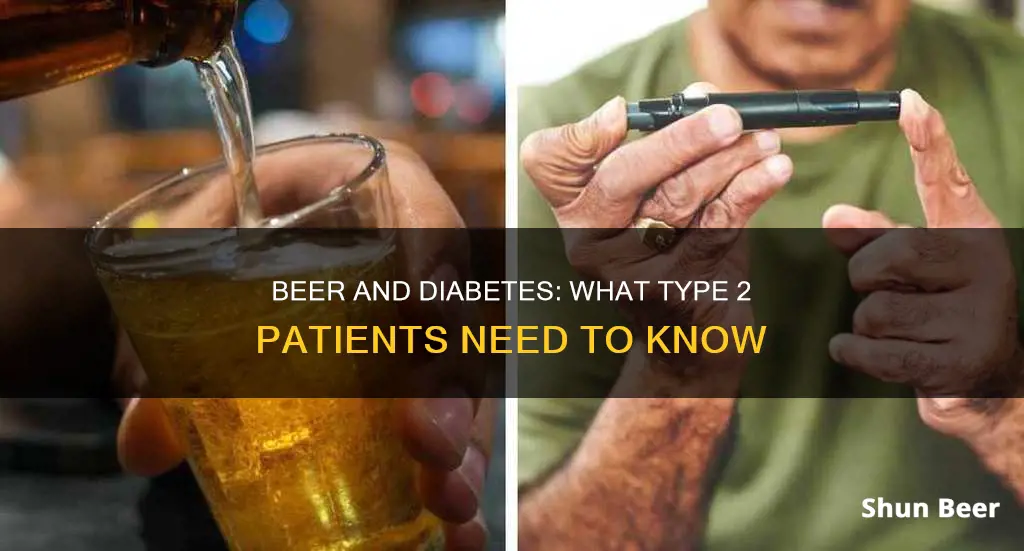
People with type 2 diabetes do not need to abstain from alcohol entirely, but they should be aware of how it can affect their body and how to manage this. Alcohol can interfere with the liver's ability to regulate blood sugar, and it can also interact with some medications prescribed to people with diabetes. This can lead to hypoglycaemia or insulin shock, which is a medical emergency. Therefore, it is important to never drink alcohol on an empty stomach and to always test blood sugar levels before drinking.
| Characteristics | Values |
|---|---|
| Alcohol consumption recommendations | No more than one drink a day for women and up to two drinks a day for men |
| Binge drinking | More than four drinks (for women) or five drinks (for men) within two hours |
| One drink | 12 ounces, or one can or bottle of beer |
| "Light" beers | Lowest in carbs, calories, and alcohol |
| Hoppy craft beers | Higher in carbs, calories, and alcohol |
| Hypoglycemia | Low blood sugar |
| Hyperglycemia | High blood sugar |
| Insulin | A hormone produced by the pancreas that helps cells absorb the sugar they need for energy |
| Type 2 diabetes | Having too much blood glucose |
What You'll Learn

Alcohol can cause hypoglycaemia
Additionally, drinking on an empty stomach or when blood sugar levels are already low increases the likelihood of hypoglycaemia. Alcohol can also impair judgement, so those who are drinking may not realise that their blood sugar is low. The effects of alcohol on blood sugar can last up to 24 hours, so it is important to monitor blood sugar levels closely during and after drinking.
Symptoms of hypoglycaemia include:
- Lightheadedness or dizziness
- Shakiness
- Confusion
- Hunger
- Sweating
- Pale skin
- Seizures or coma (in severe cases)
It can be challenging to tell if someone is experiencing hypoglycaemia or intoxication, as they share many of the same symptoms. Therefore, it is important to monitor blood sugar levels when drinking alcohol, especially for those with diabetes.
To prevent hypoglycaemia when drinking, it is recommended to:
- Not drink on an empty stomach
- Limit alcohol consumption
- Drink at a slow or moderate pace
- Monitor blood sugar levels while drinking and up to 24 hours after
Beer on American Airlines: What's Allowed and What's Not
You may want to see also

Alcohol can interact with diabetes medications
Alcohol Interferes with the Liver's Ability to Regulate Blood Sugar
The liver is responsible for storing glycogen, which is the stored form of glucose, and releasing it into the bloodstream when needed. When you drink alcohol, your liver has to work to remove it from your blood instead of regulating blood sugar. This can lead to a drop in blood sugar levels, which can be dangerous for people with diabetes.
Alcohol Interacts with Diabetes Medications that Lower Blood Sugar
Some diabetes medications, such as insulin, sulfonylureas, and meglitinides, work by lowering blood glucose levels. Combining these medications with alcohol can lead to a further decrease in blood sugar levels, resulting in hypoglycemia or "insulin shock," which is a medical emergency.
Alcohol Can Increase the Risk of Complications
Drinking alcohol can make some of the complications of diabetes worse. For example, excessive alcohol use can lead to weight gain, high blood pressure, nerve damage, and an increased risk of certain cancers and heart disease.
Alcohol May Affect the Absorption and Metabolism of Medications
Alcohol can affect the absorption and metabolism of certain medications, including diabetes medications. This can alter the effectiveness of the medication and potentially lead to dangerous interactions.
Alcohol May Impair Judgement and Mask Hypoglycemia Symptoms
Alcohol can cloud your judgement and make it difficult to recognize the symptoms of low blood sugar. This can be especially dangerous for people with diabetes, as they may not realize that their blood sugar levels have dropped to dangerous levels.
Alcohol May Increase the Risk of Medication Non-Adherence
Drinking alcohol can lead to forgetfulness and make it easier to mix up or miss doses of medication. This can be dangerous for people with diabetes, as maintaining consistent medication regimens is crucial for managing their condition.
Post-Hysterectomy: Beer Drinking and Recovery
You may want to see also

Alcohol can cause hyperglycaemia
When you drink alcohol, it is absorbed directly into the bloodstream from the stomach or small intestine, and then carried through the body to the liver. The liver is where excess glucose is stored in a form called glycogen. When blood sugar levels dip, the liver usually converts glycogen into glucose, which is then released into the bloodstream to bring levels back to normal. However, when alcohol is present, the liver focuses on metabolising it instead of regulating blood sugar. This means that blood glucose levels can remain low.
While alcohol can lower blood sugar levels, it also has the potential to increase them. Regular, long-term alcohol use has been shown to increase insulin resistance. This can lead to hyperglycaemia, or high blood sugar, which can cause a host of symptoms, from thirst and frequent urination to slow-healing wounds and disorientation.
If you have type 2 diabetes, drinking alcohol may make it even harder to manage your blood sugar levels. It's important to keep in mind that the risks of drinking alcohol when you have type 2 diabetes may outweigh any potential benefits.
Understanding Beer Bikes: How Do They Work?
You may want to see also

Alcohol can cause weight gain
People with type 2 diabetes do not need to cut alcohol out of their diet. In fact, light drinking (no more than one to two drinks a day) may be beneficial to diabetes. However, there are some important safety considerations for people with diabetes. Alcohol can affect blood sugar levels and cause weight gain.
Alcohol can also make you feel hungrier and less satisfied after eating. It can lead to cravings for salty and greasy foods, and you may make poor food choices when drinking. Alcohol can affect your inhibitions and impair your judgement, so you may be more likely to overeat or choose unhealthy foods.
The amount of weight you gain from alcohol depends on various factors, including what you drink, how much you drink, how often you drink, what you eat when you drink, and your unique body and lifestyle. For example, beer is typically higher in carbs and calories than wine or liquor, but the exact amount varies depending on the type of beer. "Light" beers have the fewest carbs and the lowest alcohol content, while hoppy craft beers like IPAs and stouts tend to be much higher in carbs, calories, and alcohol.
If you are trying to lose weight, reducing your alcohol intake can help. You don't have to cut it out entirely, but it's important to consume alcohol mindfully. Watch the number and type of drinks you choose, and pay attention to how drinking affects your eating habits. It's recommended that anyone who drinks does so in moderation, which means no more than one drink per day for women and no more than two drinks per day for men. You may want to drink less than this if you're trying to lose weight.
Enjoying Beer on Naples Beach: What You Need to Know
You may want to see also

Alcohol can increase the risk of other health issues
Alcohol can also affect fertility in men and women, so it is important to cut back if trying to conceive. For pregnant women, it is safest to abstain from alcohol altogether. Drinking during pregnancy, especially in the first three months, may increase the risk of miscarriage, stillbirth, premature birth, and foetal alcohol syndrome.
Alcohol can also negatively impact mental health. While some people may turn to alcohol to help manage stress or low moods, this is not a healthy coping mechanism. Instead, it is recommended to try getting more active, starting a hobby, or doing something relaxing, like reading a book.
Detox and Drinking: Is Having a Beer Safe?
You may want to see also







